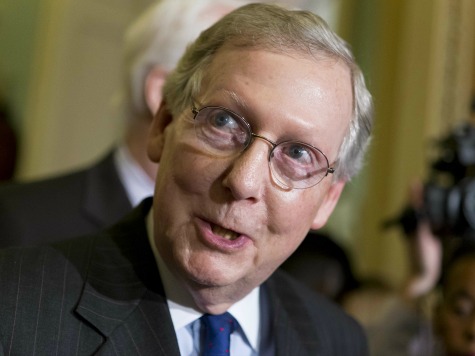On Tuesday, Senate Minority Leader Mitch McConnell (R-KY) came out swinging against President Obama’s proposal for Congressional authorization of military force against Syria and the Bashar Assad regime. McConnell said that President Obama’s chaotic rollout of his case for military action made supporting it impossible: “this debate has been made more difficult because even those of us who truly want to support the Commander in Chief have struggled to understand the purpose of the mission.” He said, “no one should be faulted for being skeptical about this proposal, regardless of what party they’re in, or for being dumfounded at the ham-handed manner in which the White House announced it; there is absolutely no reason to signal to the enemy when and how, and for how long, you plan to strike them — none. As I’ve said before, you don’t send out a ‘save-the-date’ card to the enemy.”
McConnell placed his opposition to Obama’s Syria policy in the context of Obama’s broader foreign policy: “On the deepest level, I think it comes down to a fundamentally different view of America’s role in the world. Unlike the President, I’ve always been a firm and unapologetic believer in the idea that America isn’t just another nation among many; that we’re exceptional. As I’ve said, I believe we have a duty, as a superpower without imperialistic aims, to help maintain an international order and balance of power that we and other allies have worked very hard on over the years. This President, on the other hand, has always been a very reluctant Commander in Chief. We saw that in the rhetoric of his famous Cairo speech, and in speeches he gave in other foreign capitals in the early days of his administration. The tone, and the policies that followed, were meant to project a humbler, more withdrawn America … and, frankly, I’m hard pressed to see any of the good that’s come from it.”
McConnell pointed out that Syrian chemical weapons had not been used on any American ally; he also added that Secretary of State John Kerry had stated that chemical weapons had been used on multiple occasions before last month’s Damascus attack, begging a “further question here about why the administration didn’t respond on those occasions”; he pointed out that Assad would continue to kill his enemies using non-chemical weapons; he questioned whether “degrading Assad’s control of these weapons” would “make it easier for other extremist elements, like those associated with the Al Nusrah front and Al Qaeda, to get hold of them?”
“[U]ltimately, I’ve concluded that being credible on Syria requires presenting a credible response, and having a credible strategy. And for all the reasons I’ve indicated, this proposal just doesn’t pass muster,” McConnell said. “[M]ore broadly, and this is my larger point, this one punitive strike we’re debating could not make up for the President’s performance over the past five years. The only way — the only way — for him to achieve the credibility he seeks is by embracing the kind of serious, integrated national security plan that matches strategy to resources, capabilities to commitments, and which shows our allies around the world that the U.S. is fully engaged and ready to act at a moment’s notice in all the major areas of concern around the globe, whether it’s the Mediterranean, the Persian Gulf, or in the South China Sea. And, just as importantly, that he’s willing to invest in that strategy for the long-term…. It is long past time this President drops the pose of the reluctant warrior — and lead. You can’t build an effective foreign policy on the vilification of your predecessor alone. At some point, you have to take responsibility for your own actions, and see the world the way it is, not the way you’d liked it to be.”
Ben Shapiro is Editor-At-Large of Breitbart News and author of the New York Times bestseller “Bullies: How the Left’s Culture of Fear and Intimidation Silences America” (Threshold Editions, January 8, 2013).

COMMENTS
Please let us know if you're having issues with commenting.